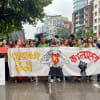Why is it taking so long to restore normal business conditions?

A falling tide lowers all ships, so it is natural that the recent disruptions in the country hit every economic sector, but there are some that have been hit harder than others. These units or groups, comprising low-income workers and entrepreneurs, belong to the lower strata of our economy and, as such, rarely feature in policy decisions even during critical times such as now. According to various reports, the nationwide curfew and internet shutdown, while aimed at restoring order after the unprecedented violence that erupted since July 18, have exacerbated the hardships faced by daily wage earners and small business owners, pushing many to the brink of financial ruin.
A report from our Khulna correspondent highlights the sufferings of low-income workers including hawkers, porters, cobblers, transport and construction workers whose earnings have plummeted. This is not just in one city, but across urban centres in the country. Day labourers, who typically find work at busy intersections, are having to wait for hours with little success. Homeowners are hesitant to resume construction work leading to a slump in employment. Many, as a result, are being forced to borrow to survive. Many are turning to alternative means of livelihood, earning a fraction of their usual daily income. Even the relaxation of curfew hours hasn't helped much, thanks to the climate of fear created by the block raids and mass arrests conducted by security forces which is causing further economic distress.
This dire situation in informal economy is being mirrored in the entrepreneurial sector as well. According to the 2013 economic census by Bangladesh Bureau of Statistics (BBS), there are over 78 lakh entrepreneurs in the cottage, micro, small, and medium enterprises (CMSMEs), a number that must have multiplied by now. Reportedly, the recent disruptions and disturbances have severely impacted production, sales, and marketing activities for most SMEs. Add to that preexisting challenges such as high inflation, rising interest rates, and increased costs for services like gas and electricity.
Online-based entrepreneurs and workers have been hit particularly hard, thanks to the internet restrictions, which nearly halted their operations. The e-commerce and f-commerce sectors, including over four lakh businesses, rely heavily on internet to deliver over seven lakh products daily. Against this backdrop, the restoration of mobile internet yesterday, without granting access to key digital platforms like Facebook, YouTube, and WhatsApp, is unlikely to bring much relief.
All this paints a disturbing picture of the struggles of low-income workers, employees and entrepreneurs who are passing their days in hardship and uncertainty. They were already in trouble before the dual assaults of curfew and internet blackout—owing to Covid and other external and internal problems—and the government's failure to handle the violent backlash from quota reform protests has only intensified it. It is, therefore, imperative to urgently restore normal business conditions, particularly by fully reopening internet services. Small businesses and low-income workers are the backbone of our economy. The authorities must remove all barriers to their survival.


 For all latest news, follow The Daily Star's Google News channel.
For all latest news, follow The Daily Star's Google News channel. 











Comments